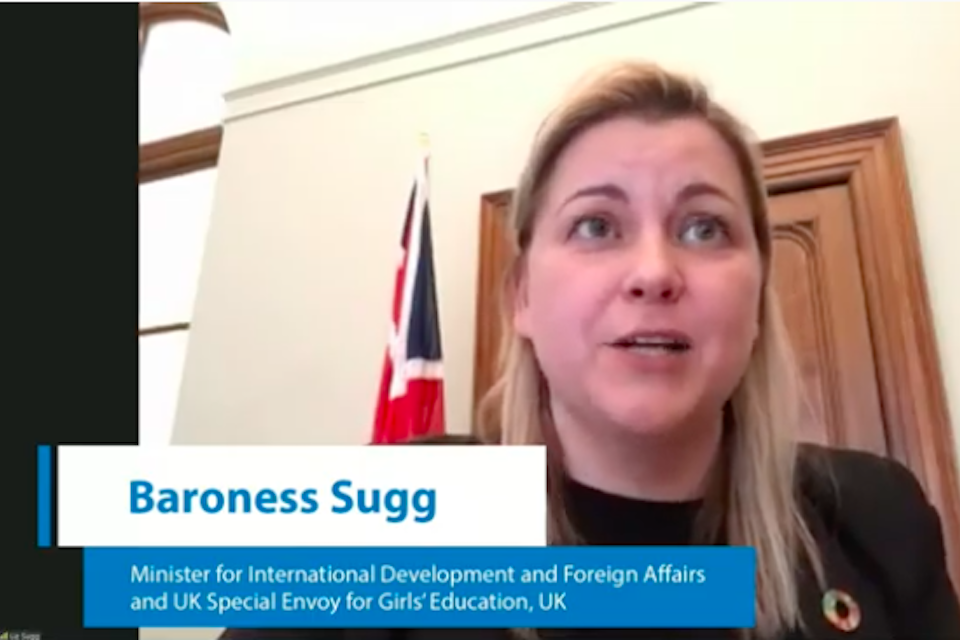Supporting every child's right to quality education
Statement by Baroness Sugg CBE, Parliamentary Under Secretary of State and Prime Minister’s Special Envoy for Girls’ Education, at the UN High-level Roundtable on continuing learning and schooling for refugees.

Thank you. It’s great to be here. Really good to hear from some of the generous host countries, Kenya and Cameroon, and I think Pakistan later on. And of course, from Vodafone. We really need more public-private sector involvement as part of the solution.
And, of course, I’d also like to thank the younger refugees we’ve heard from today amidst this unprecedented global crisis. Bahati and Mohamed inspire us and they make me optimistic that our shared future is in good hands. And it’s really vital that all of our responses are guided by their experiences and their needs.
And as we’ve heard today, the plight of refugees is exacerbated by the COVID-19 pandemic. And refugees, as we know, are among the most vulnerable, often at higher risk of poverty and malnutrition and lack access to proper healthcare or shelter, with women and girls being disproportionately affected.
For now, the international community is rightly focussed on the impacts of COVID-19, which has affected us here in the UK and all around the world. But even before the pandemic, we were already in the midst of a global learning crisis, with refugees and displaced children making up the largest group of those out of school. And at the peak of global school closures, COVID-19 has kept 1.5 billion children and young people out of school. And as the UNHCR Special Envoy highlighted, half of all secondary age girls will not return when classrooms open. And so if we are truly to build back better, which we all want to do, education must be prioritised in the global recovery from the coronavirus.
It’s really clear from our discussions today that this epidemic is not just a health crisis, it’s an education crisis, especially for refugee children, which is why it’s essential to ensure that education systems not only recover but recover better, providing all children with the skills to survive and to thrive. And without an education, these children will be unable to rebuild their lives and achieve their full potential.
We are therefore grateful for UNESCO convening the Global Education Coalition, which has brought together multilateral partners, private sector organisations and NGOs in response to the crisis. And the UK is proud of our support to UNESCO’s Institute for Statistics, which is leading the push on education data, which is vital to ensure that the responses reach those most in need.
In the last four months, the UK has adapted and reprioritised our education programs in 18 countries we work to support education systems and help keep people safe during the pandemic. And we fully recognise the importance of including refugees in national responses in line with the Global Compact on Refugees.
And of course, we must not forget the role of teachers like Mohamed in refugee education. Refugee children and their communities rely on teachers to provide education. But in this pandemic, they’re relied on for so much more, including psychosocial support and vital health information. So I’m really delighted to announce today $6.7 million of new UK funding to UNHCR, which will enable more than 5,000 teachers to provide that vital education for children in 10 refugee hosting countries over the crucial next seven months. And this funding will ensure children can continue to benefit from education during school closures and will mean teachers can provide vital outreach to get children back to school once they reopen.
We know that supporting every child’s right to 12 years of quality education is one of the best investments we can make to end the cycle of displacement, poverty and conflict as we recover from coronavirus. This is a major development priority for us here in the UK, but it will require a global effort. The UK will be backing UNICEF’s Open Up Better campaign and many other efforts to get children back to school when it’s safe to do so. And we must place the needs of refugees and the most vulnerable children at the heart of that process.
So thank you, and I look forward to our continued work together to ensure that our efforts help those that need it most.